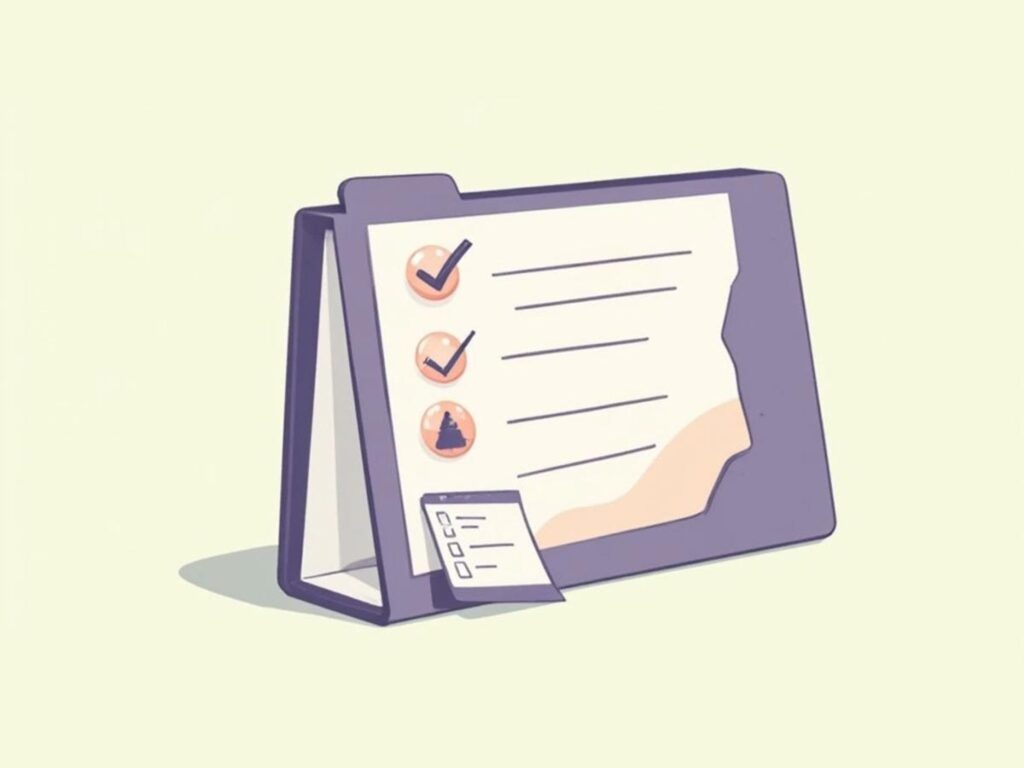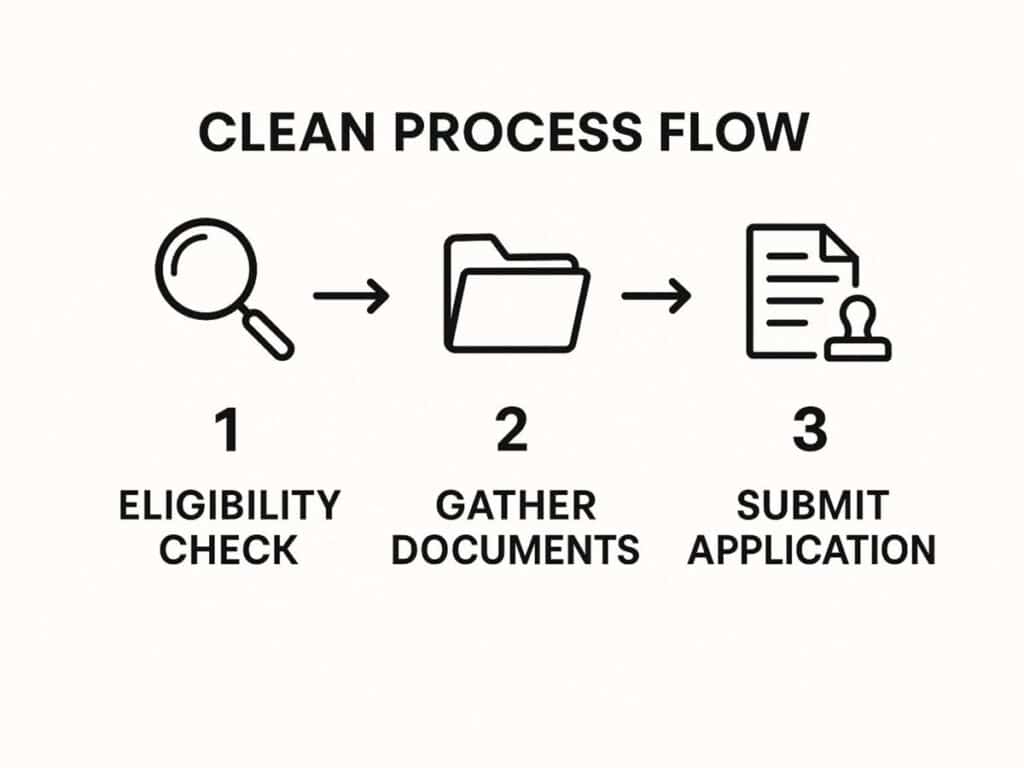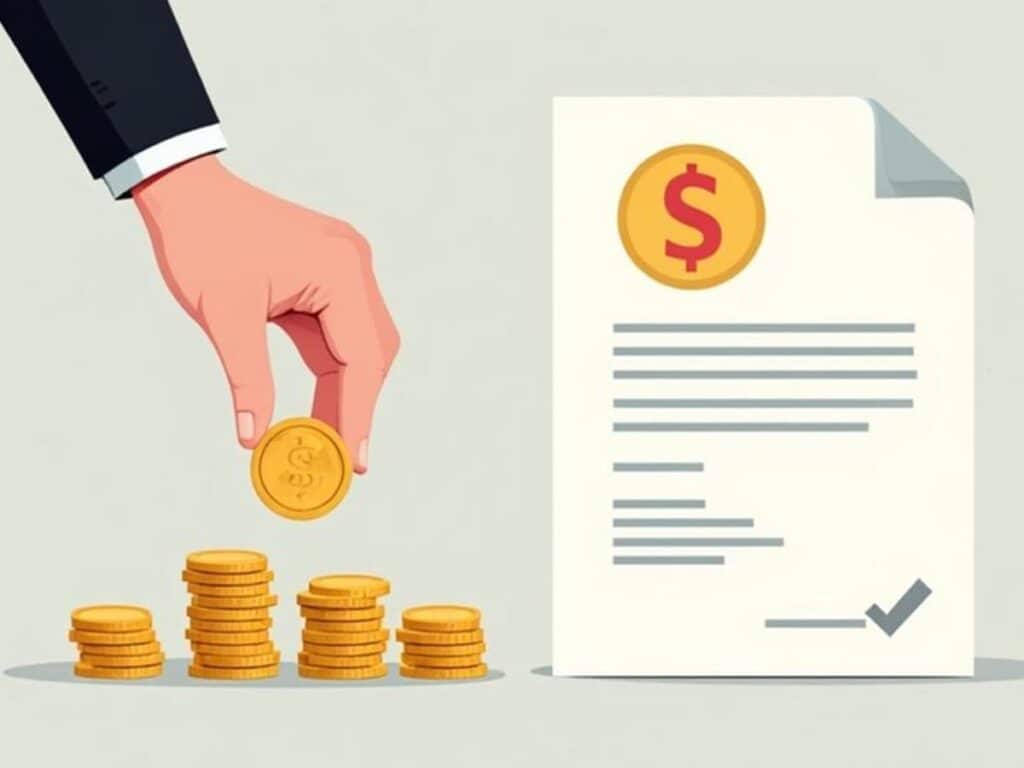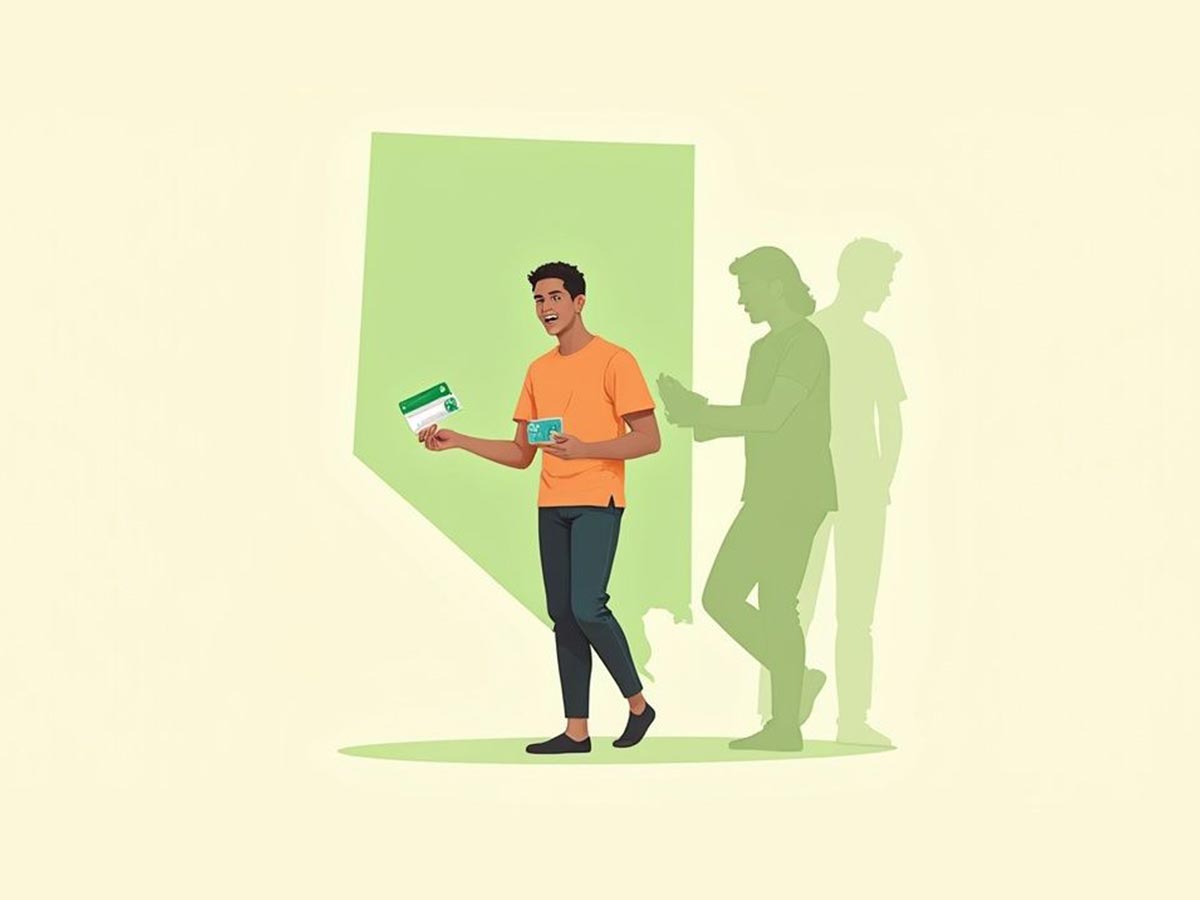Securing a medical card in Nevada is a clear, three-phase journey: confirm you have a qualifying health condition, get a doctor’s recommendation, and submit your application through the state’s online portal. It might sound complex, but once you see the roadmap, you’ll realize it’s a straightforward path to accessing the relief you need.
Your Roadmap to a Nevada Medical Card

Navigating the process for a medical cannabis card in Nevada can feel overwhelming, but it doesn’t have to be. I’ve designed this guide to be your personal checklist, breaking down the entire journey from start to finish. We’ll demystify every requirement and arm you with actionable tips so you can move forward with total confidence.
What to Expect in This Guide
This isn’t just a list of dry rules; it’s a practical, real-world walkthrough. We’re going to cover everything you actually need to know, so there are no surprises along the way. My goal is to empower you with the information you need to take control of your health journey.
Here’s a quick look at what we’ll cover:
- Eligibility & Qualifying Conditions: A simple breakdown of who qualifies for a card in Nevada.
- Documentation & Doctor Visits: Actionable advice on preparing your paperwork and what to discuss with your physician.
- The State Application Process: A step-by-step tutorial for submitting your application online and avoiding common mistakes.
- Post-Application Timelines: A clear guide on what happens after you hit “submit,” from approval to holding your card.
This guide will also tackle common questions to ensure you’re fully prepared. For a wider view on cannabis rules, check out our detailed 2025 guide to legal cannabis use in Las Vegas.
Why get a medical card? It’s about more than just paperwork. It’s your key to accessing regulated, safe, and effective options for managing your health. It also provides crucial legal protections and can save you significant money on taxes compared to recreational purchases.
Understanding the Bigger Picture
It helps to know why the process is structured this way. Nevada’s system is part of a larger, evolving effort to balance patient access with necessary regulation. These kinds of administrative procedures are common in healthcare and are designed to ensure programs serve the right people safely.
For example, nationwide Medicaid enrollment hit about 90 million people in 2024. Each state has its own rules for eligibility and renewal, with verification steps designed to provide broad coverage while preventing fraud. Nevada’s process for medical cards follows a similar logic, ensuring a structured and accountable system.
Nevada Medical Card Process at a Glance
To give you a bird’s-eye view, here is a quick summary of the key stages, estimated times, and costs involved in getting your Nevada medical card.
| Stage | Key Action | Typical Timeline | Estimated Cost |
|---|---|---|---|
| Doctor’s Consultation | Meet with a physician to get your official medical recommendation. | 1-3 Days | $75 – $150 |
| State Application | Create an account and submit your application on the state portal. | 1-2 Hours | $50 (1-year) or $100 (2-year) |
| State Approval | Wait for the state to review and approve your application. | 24-72 Hours | N/A |
| Receive Card | Get your temporary card via email; your physical card arrives by mail. | Instantly (Temp), 7-10 Days (Physical) | N/A |
This table helps you plan your time and budget. Now, let’s dive into the actionable details of each step.
Do You Qualify for a Medical Card in Nevada?
Before you start the application, let’s tackle the most important question: do you qualify? Answering this first will save you time, money, and potential frustration. Think of it as your first green light.
Nevada has clear-cut rules about who can get a medical card, ensuring the program helps residents who genuinely need it. Let’s break down exactly what you’ll need to show.
Core Eligibility Requirements
To be considered for Nevada’s medical cannabis program, you have to meet two non-negotiable requirements.
First, you must be a Nevada resident. This means you need a valid, state-issued driver’s license or ID card as proof. While visitors can easily buy recreational cannabis, the medical program is exclusively for people who call Nevada home. If you’re curious about the rules for visitors, our guide on whether tourists can buy weed in Las Vegas has all the details.
Second, you must be at least 18 years old. Minors can still get a card, but the process requires a parent or legal guardian to act as a designated primary caregiver.
Qualifying Medical Conditions
This is the heart of your application. Your eligibility hinges on having a diagnosed medical condition that Nevada recognizes for cannabis treatment.
You’ll manage your application through the official Nevada Department of Health and Human Services portal. It’s a good idea to get familiar with it now.
Here are the conditions currently approved by the state:
- Anxiety disorder
- Autism spectrum disorder
- Cancer
- Cachexia (also known as wasting syndrome)
- Glaucoma
- HIV/AIDS
- A neuropathic condition (whether it causes seizures or not)
- Persistent muscle spasms, including those from conditions like multiple sclerosis
- Post-Traumatic Stress Disorder (PTSD)
- Seizures, including those associated with epilepsy
- Severe or chronic pain
- Severe nausea
- A disease to treat opioid dependence
There’s also a crucial catch-all category: any other chronic or debilitating medical condition that a doctor believes could be alleviated by cannabis.
This last point is a game-changer. It gives physicians the flexibility to recommend cannabis for other serious conditions not on the official list if they genuinely believe it will provide a therapeutic benefit.
Key Takeaway: You don’t have to diagnose yourself. If a chronic condition is seriously impacting your quality of life, the best first step is to talk to a qualified physician to see if you are a good candidate.
Understanding the Global Context
Programs like Nevada’s are part of a global trend toward making essential health services more accessible. According to the World Health Organization, a key goal is achieving Universal Health Coverage, which aims to ensure all people have access to the health services they need without suffering financial hardship.
This global push highlights the importance of managing chronic diseases and improving patient outcomes, which is exactly what medical cannabis programs are designed to support.
Special Circumstances for Minors and Caregivers
If you’re applying for a minor or need to become a caregiver, there are a few extra steps designed to protect the patient.
For patients under 18, a parent or legal guardian must provide written consent and agree to be the designated caregiver. This person is responsible for obtaining and administering the medical cannabis. The caregiver must be at least 21 years old and will need to pass a background check. This system ensures minors receive medical cannabis only under strict adult supervision, adding a vital layer of safety.
Preparing for a Successful Doctor’s Visit

So, you’ve confirmed you meet the state’s criteria. Excellent. Now, it’s time for the doctor’s appointment—the conversation that unlocks your official recommendation. A little preparation transforms this visit from intimidating to empowering.
Think of this appointment as a collaboration. You bring your lived experience with your health condition; the doctor brings their medical expertise. Coming prepared helps you tell your story clearly so they can fully understand your situation and needs.
Gathering Your Essential Documents
Walking into your appointment with your paperwork in order shows you’re serious and helps the physician make a confident, informed decision. It also speeds up the entire process.
Before your visit, gather these items:
- Valid Nevada ID: This is non-negotiable. The doctor must verify your residency with a driver’s license or state-issued ID card.
- Medical Records: This is your best evidence. Any documentation confirming your qualifying condition—like diagnosis letters, treatment histories, or notes from specialists—is incredibly valuable.
- List of Current Medications: Be ready to discuss every medication you’re currently taking, including names, dosages, and any side effects.
Actionable Tip: If you don’t have your records, simply call your primary doctor’s office and request a copy. They will likely have you sign a standard release form.
How to Talk to Your Doctor About Cannabis
Many people feel anxious about this conversation, but it doesn’t need to be stressful. This isn’t a test; it’s a discussion about your health. Your goal is to clearly explain your symptoms and how they impact your daily life.
Instead of saying, “I have chronic pain,” be specific.
For example: “I have persistent lower back pain that makes it difficult to sit for more than an hour, which significantly affects my ability to work at my desk.” This paints a vivid picture for the doctor.
Pro Tip: Before you go, jot down a few notes on your phone. List your main symptoms, when they started, what you’ve already tried for relief, and what you hope medical cannabis can achieve for you. This simple trick ensures you don’t forget any key details.
Asking the Right Questions
Remember, this is a two-way conversation. It’s your health, and you deserve to feel comfortable and informed.
Here are a few smart questions to ask:
- For my specific condition, what potential benefits might I see?
- Are there any potential side effects I should watch for?
- Could this interact with any of my current medications?
- Do you have any advice on starting with low doses or specific types of products?
A good doctor will welcome your engagement and answer your questions thoroughly. This conversation builds trust and ensures you’re making the best decision for your well-being.
Submitting Your Application to the State
You’ve got your doctor’s recommendation in hand—you’re in the home stretch. Now, you just need to submit everything to the state of Nevada through their online system. This is where your preparation pays off, and getting it right the first time is the secret to a fast, delay-free approval.
Think of the state’s online portal as the final checkpoint. They simply need to verify who you are, that you live in Nevada, and that a qualified doctor has signed off on your condition. Let’s walk through exactly how to master this final step.
This image visualizes how the process comes together, from confirming eligibility to hitting “submit.”

As you can see, each step builds logically on the last, leading you straight to the finish line.
Navigating the Nevada Online Portal
Everything is handled through the official Nevada Medical Marijuana Program portal. Your first step is to create an account. Once you’re in, the system will guide you through the forms.
You’ll enter your personal info—full name, date of birth, current address. This is critical: your information must match what’s on your Nevada ID perfectly. A simple typo can flag your application for a manual review and slow everything down. So, double-check every entry.
Next, you’ll upload your documents:
- A clear, high-quality photo of the front of your Nevada driver’s license or state ID.
- An equally clear photo of the back of the same ID.
- The signed physician’s recommendation form from your doctor.
Actionable Tip: Take these photos in a well-lit room against a plain background, like a kitchen counter. Make sure there’s no glare and that every word is perfectly readable.
Understanding the State Fees
As you proceed, you’ll reach the payment section. Nevada offers two options, allowing you to choose what fits your budget and timeline.
You can select either:
- A one-year card for a $50 fee.
- A two-year card for a $100 fee.
The two-year option is typically the better value, saving you the hassle of renewing in just twelve months. You’ll pay this fee directly on the portal with a debit or credit card.
Avoiding Common Application Pitfalls
Many applications get delayed by small, preventable mistakes. Knowing what to watch for ensures your submission sails through.
Here are the top issues that cause delays:
- Blurry or Unreadable ID Photos: If they can’t read your name, address, or expiration date, they will reject it instantly.
- Mismatched Information: The name and address you type must be an exact match to what’s printed on your ID.
- Incomplete Physician Form: Before uploading, confirm every field is filled out and signed.
- Forgetting the Back of Your ID: It’s a common mistake. The state needs both the front and the back.
Final Check: Before you hit that final “submit” button, take five minutes to review everything. Pretend you’re the state reviewer. Is every document crystal clear? Does all the information match perfectly? That last check can save you days of waiting.
Why This Process Matters in the Broader Healthcare Context
Nevada’s detailed steps are part of a larger picture of managing healthcare access amid rising costs. The 2025 Global Medical Trends Survey, for instance, projects a significant global medical cost increase. This financial pressure forces governments to create careful, structured programs to ensure resources are used effectively and accountably. By following these steps carefully, you’re ensuring a smooth and quick approval.
What to Expect After You Apply

You’ve double-checked every detail and hit submit. Now comes the waiting game. But don’t worry—this isn’t a bureaucratic black hole. Nevada’s system is remarkably efficient, and understanding what happens next makes this period much less stressful.
You’re not going to be waiting for weeks on end. Let’s walk through the timeline so you know exactly what to look for.
Keeping Tabs on Your Application
You won’t be left in the dark. The best way to stay updated is to check the same online portal where you submitted your application. Log in once a day to see if your status has changed from “Submitted” to “Under Review,” and finally, “Approved.” This transparency is your best friend while you wait.
The Approval Timeline: How Long Does It Really Take?
Most applicants are surprised by how quickly things move.
- An error-free application is typically reviewed and processed by the state within 24 to 72 hours.
- As soon as you’re approved, you’ll receive an official email notification. That email is your green light.
This rapid turnaround is a huge benefit of Nevada’s program, ensuring you get the relief you need without unnecessary delays.
Once that approval email hits your inbox, you are officially a registered patient. Even without a physical card, you can immediately start purchasing from a licensed dispensary.
Using Your Temporary Digital Card Right Away
This is the most important part to remember after you’re approved. Nevada instantly issues you a temporary digital card, which you can access by logging back into the state portal.
This temporary card is an official document. Save it to your phone or print it out. It works just like the physical card and is valid at any licensed Nevada dispensary. This means you don’t have to wait for the mail to visit a place like Wallflower Cannabis House; you can make a purchase the very same day you’re approved.
For example: If you’re dealing with chronic pain and get approved on a Friday, you don’t have to suffer through the weekend. You can get your medicine right away. It’s a game-changer.
Your Physical Card Is in the Mail
While the temporary card provides instant access, a permanent, durable plastic card will be mailed to your home address.
Typically, your physical card will arrive within 7 to 10 business days of your approval. Once it arrives, start using it instead of the temporary one—it’s more convenient and built to last.
What to Do If There’s a Holdup
What if a few days pass and your application is still “Under Review”? First, don’t panic. Delays are almost always caused by small, fixable mistakes.
Common reasons for a delay include:
- A blurry photo of your ID.
- A name or address mismatch.
- An incomplete physician’s recommendation form.
If there’s an issue, the state will email you a Request for Information (RFI) explaining what needs to be fixed. Act on it immediately. Log back into the portal, upload the corrected information, and resubmit. Addressing it quickly gets your application right back on track.
Common Questions About Nevada Medical Cards
Even with a step-by-step guide, it’s normal to have a few more questions. Let’s tackle some of the most common ones so you can move forward with complete confidence.
Having these answers upfront can help you sidestep any unexpected bumps in the road.
How Long Is a Nevada Medical Card Valid For?
When you apply, you can choose between a one-year and a two-year card. The two-year option typically offers better long-term value.
Your card has an expiration date. Before it expires, you’ll need to renew it by getting a new physician’s recommendation and resubmitting your application. Actionable Tip: Start the renewal process 30 to 60 days before your card expires. This provides a comfortable buffer and ensures you don’t have a gap in legal access to your medicine.
Can I Use My Nevada Card in Other States?
This is a great question, but the answer is complex. The concept is called reciprocity—when one state honors another’s medical cannabis laws. While some states offer reciprocity, the rules vary dramatically.
For example, another state might allow you to legally possess cannabis with your Nevada card but not purchase from their dispensaries. Because these laws are constantly changing, always check the specific regulations for any state you plan to visit. A quick search for the state’s official government health department website will provide the most current information.
What Happens If My Application Is Denied?
First, don’t panic. If your application is denied, the Nevada Medical Marijuana Program will mail you a letter explaining exactly why. This isn’t the end of the road; it’s a signal that something needs to be corrected.
Most denials happen for simple reasons, like:
- An incomplete section on the application.
- A typo on a submitted document.
- Not meeting residency or qualifying condition requirements.
The letter will outline how to appeal the decision or, more commonly, how to correct your application and resubmit it.
The single most important thing you can do is read that denial letter carefully. The state isn’t trying to trick you—they will tell you precisely what to fix. The sooner you correct the error, the sooner you’ll get your approval.
Does a Medical Card Affect My Gun Rights in Nevada?
This is a tricky legal area. It involves a direct conflict between Nevada state law, which permits medical cannabis, and federal law, which still classifies it as a Schedule I controlled substance.
Federal law prohibits any “unlawful user of… any controlled substance” from owning a firearm. This creates a significant legal gray area for medical cannabis patients. Because firearm rights are a serious matter, it is strongly advised that you speak with an attorney who specializes in this specific area of law. They can provide clear, accurate advice for your personal situation. For a broader overview of local rules, you can also check out our guide on Las Vegas weed laws.
Ready to explore a curated selection of premium cannabis products with your new medical card? Visit Wallflower Cannabis House for a personalized and welcoming dispensary experience. Check out our menu and daily deals at Wallflower Cannabis House.

